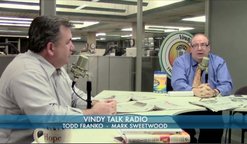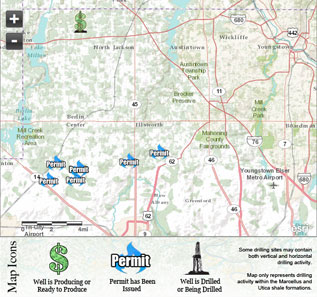Useful Links
Documents
- Injection Well AWMS Orders
- KDA Affidavit
- US vs. Ben Lupo - Indictment
- US vs. Ben Lupo - Criminal Complaint
- Final Analytical Report for Ohio EPA-NEDO
- D&L Sample Results Statement
- OhioEPA IPIR
- OhioEPA Notice of Violation
- Patriot vs. Ohio EPA Decision
- EPA Response - Patriot Water
- Patriot vs. Ohio EPA Motion to Dismiss
- ALOV Trumbull Group Lease

« Shale Sheet Home
Trying to combat growing drug trade in oil patch
By SHARON COHEN
Associated Press
WILLISTON, N.D.
The blood-drenched man had survived a brutal attack: Beaten with brass knuckles, shocked with a stun gun, slashed with a razor blade, then dumped 40 miles away in Montana, he staggered to a farmhouse for help. His path eventually led authorities back to a quiet backyard in this oil boom town.
What they uncovered was a large-scale methamphetamine ring that had found a home in a state long known for its small-town solitude, its slow pace and peaceful pastures.
The members of this violent gang were all relative newcomers to Williston. They called themselves “The Family,” the feds say, and were holed up in a few campers tucked behind an innocent-looking, white-frame house. They had plenty of firepower, too: One of the men had an arsenal of 22 weapons.
Authorities say several “Family” members had abducted and planned to kill one of their own, seeking to enforce their code of silence out of fear he’d spill the group’s secrets. They assaulted him in a camper in Williston, stuffed him into a plastic-lined car trunk, then beat him again after he escaped. He was left for dead in a Montana field. He wound up, instead, in a North Dakota hospital, telling the FBI his story.
The result: Seven guilty pleas. Prison sentences of up to 20 years. And the dismantling of a drug-trafficking ring that sold meth for more than a year in one of the fastest-growing corners of America.
The oil boom in the Bakken shale fields has touched off an explosion of growth and wealth on this remote wind-swept prairie. Big money is raining down in small towns. Oil rigs light up the night sky.
But the bonanza suddenly flourishing here also has brought with it a dark side: a growing trade in meth, heroin, cocaine and marijuana, the shadow of sinister cartels and newfound violence.
Small-town police forces have been struggling to keep pace. In nearby Watford City, for instance, police calls for service have multiplied at a staggering rate — almost 100 times — in a five-year period. County jails overflow on weekend nights. Local sheriffs no longer know every name and face when they stroll down Main Street.
Drugs and dealers are popping up in all kinds of places: Heroin is being trafficked on isolated Indian reservations. Mexican cartels are slowly making inroads in small-town America. And hard-core criminals are bringing drugs in from other states, sometimes concealing them in ingenious ways: liquid meth in windshield-wiper reservoirs.
“Organized drug dealers are smart,” says U.S. Attorney Tim Purdon. “They’re good businessmen. They go where the demand is, and that’s what we’re seeing here. ... There’s simply a lot of money involved, a lot of money flowing around in those communities.”
With the problems becoming more pronounced, the feds are pouring in resources to bolster local police and drug-task forces.
“We’re battling our butts off to stay ahead of this,” Purdon says. “Our concern is that this is an open market and as people start to compete, the violence will increase. ... There’s nothing less at stake here than our way of life.”
The oil boom with its gusher of dollars was already under way more than three years ago when Tim Purdon was sworn in as chief federal prosecutor for western North Dakota.
The Bakken Formation — tens of thousands of square miles of oil-bearing shale under the long, flat prairies of western North Dakota, eastern Montana and part of Canada — was touted as a modern-day Gold Rush. Thousands flocked here, most law-abiding Americans in search of good-paying jobs. But the lure of big money was a guaranteed draw, too, for drug dealers and other troublemakers.
As the population skyrocketed, Purdon noticed a seemingly inevitable consequence: more people, more crime.
Federal prosecutions in the western half of North Dakota nearly tripled — from 126 in 2009 to 336 last year — mostly, he says, because of drug cases involving several people.
In Montana, 70 people — about half from outside the region — have been charged since October with federal drug offenses. Last spring, about 10 others, including two reputed members of the notorious Sinaloa cartel, were accused in a drug conspiracy. The two pleaded guilty to distributing at least 80 pounds of meth to local drug dealers within a five-month period; the intended market, the feds say, was the oil patch.
The cartel members also traded meth for about 150 guns, some of which made their way to Mexico, according to authorities.
“We have a formidable opponent,” says Mike Cotter, U.S. Attorney in Montana. “They market it well. They move it well, and it’s a battle that we have to continue to fight.”
It’s not one that’s readily visible.
Drug deals here are arranged in phone calls, behind closed doors or along back streets of once-sleepy towns now pulsating with the work of a multibillion-dollar oil industry. Tanker trucks rumble down the roads day and night. Recent arrivals come and go from “man camps” — rows of identical, barrack-like dorms sitting on empty fields. And cars with license plates from almost every state in the union zip in and out of crowded fast-food parking lots.
“The idea of having junkies hanging around the rigs and the fracking sites — that’s not happening,” says Williams County Sheriff Scott Busching.
Drugs are not new here. Years ago, homegrown meth was a scourge in North Dakota, but its supply was sharply reduced by a crackdown on “mom-and-pop” meth labs and legislation that made it harder to buy ingredients.
These days, the drug trade looks a lot different.
Meth is still most common, but most of it originates in Mexico. It’s more potent and is generally being found in larger quantities. (In Ward County, about two hours away, meth seizures jumped from $63,200 in 2012 to $404,600 last year, according to the sheriff’s office.)
Heroin is more visible, something that “scares me,” says Busching, who adds that he’d probably rate the drug problem in his county a 7 on a scale of 10.
Prices are up, too, fueled by demand in an area where lots of young men are flush with cash, far from their families and have little to do in their spare time. Authorities say a gram of meth that might sell for $120 in big cities can cost $200 in Williston. In Montana, an ounce that might have sold for $800 in 2008 now goes for about $2,400 to $2,800.
Guns also are increasingly becoming part of the business.
“We’re seeing a lot more armed drug traffickers than I’ve previously noticed,” says Derek Hill, an ATF agent in Bismarck. “It’s kind of a two-way street,” he adds, with guns used as protection and for barter.
The ATF opened a bureau last year in the tiny town of Bottineau, and within the first five months, the agent had opened 14 weapons cases throughout western North Dakota, many also involving drugs, says Scott Sweetow, special agent in charge in the region.
Another difference: Authorities are seeing more criminals from out of state, some with long rap sheets. One of the suspects arrested by the Bottineau agent had 15 felonies, according to the ATF.
The seven men in the 2012 abduction-drug conspiracy had all come to Williston within two years before their arrests. Brian Dahl, also known as Kodiak, had transported meth from Washington, according to documents. Though his felony record should have barred him from owning firearms, he was arrested with nine rifles, six pistols, four shotguns and three revolvers. He’s awaiting sentencing.
Jeffrey Jim Butler, also known as Pops, identified by the feds as The Family’s recruiter, had an assault and drug record. He’s serving a 20-year sentence after pleading guilty to kidnapping and conspiracy to distribute methamphetamine.
















Subscribe Today
Sign up for our email newsletter to receive daily news.
Want more? Click here to subscribe to either the Print or Digital Editions.